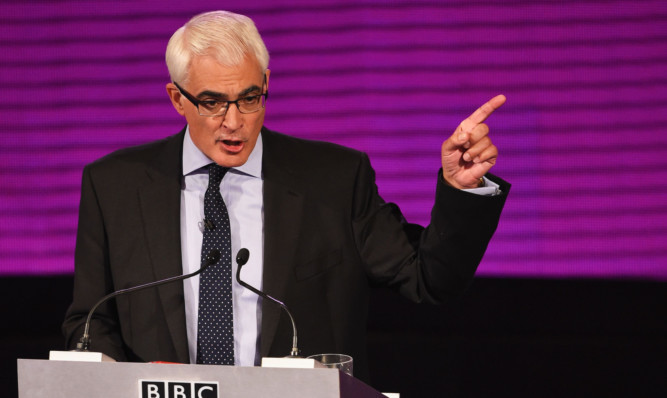Well there we have it. It has all been laid bare and the 843,000 BBC One Scotland viewers heard it.
On Monday night at the big TV debate the First Minister demolished the central plank of the No campaign’s argument. An argument that was based on a coldly calculated and deliberate misrepresentation.
Alistair Darling, the earnest leader of the No campaign, admitted live to the nation that Scotland can use the pound if we vote “yes”.
I think the theory was, if you keep saying we can’t use the pound, then it might just come true. A sad state of affairs that their battle to save the union has pretty much come down to this single inaccurate claim. You’ve all seen it: “Leave the UK, lose the pound” has been their oft-repeated message rather than any positive vision for the future, but it has been the sad reality of the No campaign. As their central claim collapsed on Monday evening, so did their campaign.
So let’s be clear once and for all, it’s Scotland’s pound, and, as Alistair Darling confirmed, no one can stop us using it.
We can use the pound without Westminster’s permission and that is another reason why we will end up sharing the pound as part of an agreed arrangement the common sense outcome for Scotland and the rest of the UK.
As Nobel-prize winning economist Professor Joseph Stiglitz said this week at the Edinburgh International Book Festival, the UK Government statements ruling out a currency union with an independent Scotland are “bluffs”.
Professor Stiglitz said he had been shocked at the use of fear as a tactic by the No side in the referendum campaign.
He argued currency union could work, saying: “If you look at the statistics for the similarities of Scotland and England, they are sufficiently similar that a currency area could work, that’s what the Fiscal Commission recommended.”
There lots of other world leading economists and academics such as Professor Sir Donald Mackay, the former chairman of Scottish Enterprise, who also agree. Some of the more reasonable politicians on the No side, including former Labour First Minister, Henry McLeish, are also quick to highlight the campaign tactic being adopted by the No campaign.
Funnily enough, when the Fiscal Commission Working Group, which included two Nobel Laureates, published its report all those months ago it predicted the fall out over currency. The report warned: “It is important to acknowledge that political considerations will play a role and may cloud pre-referendum comments and policy statements. However, these are likely to differ from the actual decisions taken post-referendum when agreement is likely to take place where there are common interests.”
The other part of the No campaign argument that hit the rails was the claim that there will be further powers devolved after a “no” vote. When pressed, Darling couldn’t name a single substantial job-creating power he would devolve.
It’s a “yes” or “no” vote, there is no other option (and remember it was Westminster that blocked a third option in the referendum). If the No campaign wanted further powers they would have put it on the ballot paper. We should know them by their actions and not their words.
With the postal votes out this week, a strong performance from the First Minister was really needed. A fifth of registered voters have opted for postal ballot votes so it’s an important week.
What was really interesting was how Mr Salmond made a concerted effort to outline the consequences of voting “no”. It was probably the first time voters in Scotland had heard it so plainly.
With a “no” vote, we will continue under Westminster’s benefit cut plans, which Labour do not oppose, meaning up to 100,000 more children will be plunged into poverty by 2020.
And this when over £100 billion is to be spent on a new generation of weapons of mass destruction. And it is a statement of the obvious that with Westminster planning more budget cuts after the next election £25 billion according to George Osborne (with Labour accepting Tory spending plans) the NHS would suffer. The Westminster all-party group on taxation published a report suggesting a £4 billion cut in Scotland’s budget after a “no” vote.
And let’s not forget, a “no” vote means we could have Boris Johnson as the next PM who has said there is “no reason” for Scotland to have more powers. This week he confirmed he will stand for election in the Uxbridge and South Ruislip seat, paving his way to Westminster.
So we are clearer on what a “no” vote means. The No campaign’s job from the very beginning has been to create uncertainty. But as the consequences of a “no” become clearer, they are being called out by voters across Scotland who have woken up to the dark and hollow nature of so much of the No campaign
A “yes” vote means decisions about Scotland made by the people of Scotland, thepeople who care most about our country, and certainly not Boris Johnson.
No more games. No more bluffs. We will have the responsibility, and with that comes opportunity.
What could be better for our country than to have our own future in our own hands?
